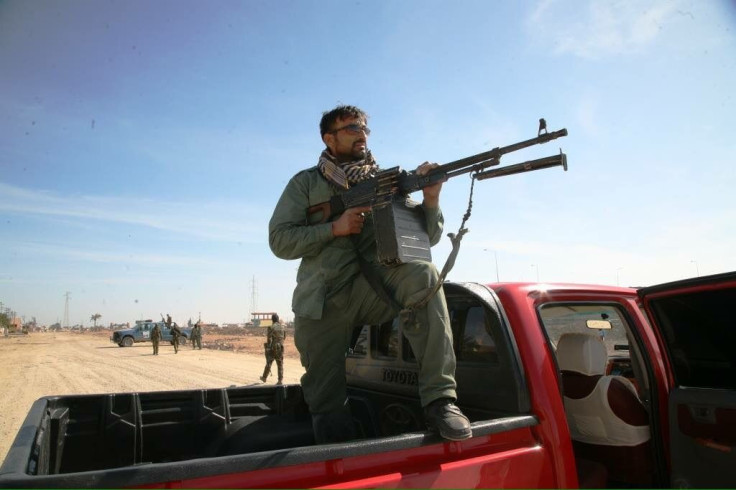The US Anti-ISIS Strategy In Iraq’s Anbar Province Is Not Working

ISTANBUL -- The U.S. effort to stop the Islamic State group in Iraq’s Anbar province, though only a few months old, is being hindered by the Iraqi military, the partner President Barack Obama said on multiple occasions was cooperating with all of the country’s sects to stop the militant group’s advance. In a replay of the “Sunni Awakening” strategy in 2006 that funneled arms to Sunni tribes in western Iraq in a successful bid to stop al Qaeda, the U.S. enlisted tribal leaders to halt the Islamic State group with American weapons. But now leaders and their fighters say they have not received any of those weapons, because the Shiite-dominated Iraqi Army is hoarding them in Baghdad.
“The U.S. government has not provided us with the weapons directly. The Iraqi military has them,” Muhand Murshad Drueesh Alwany, a Sunni militiaman in Ramadi who also fought alongside U.S. troops in Anbar in 2007, told International Business Times. “American soldiers are so far only consulting and training in their mission in Anbar, and are also conducting airstrikes.”
The first U.S. troops to enter Anbar in the fight against the Islamic State group, also known as ISIS or ISIL, arrived in November. Obama had sent 1,400 of them to the area to help the Iraqi military plan the fight against the extremist group, which at that point had already taken over more than 80 percent of the province. Hundreds are now stationed at Asad airbase training Iraqi soldiers. But they are also supposed to be building up a Sunni-dominated national guard made of tribesmen, which Sunni tribal fighters say is not actually happening as yet.
The establishment of such a force has been hindered by deep rifts between Sunnis who fought under deposed dictator Saddam Hussein, some of whom ended up fighting for the Americans, and Shiites formerly loyal to Prime Minister Nouri al-Maliki, a Shiite who left power last year after antagonizing Sunnis with repressive policies.
In western and northern Iraq, Sunnis found themselves facing the ISIS advance alone last year when the regular army proved incapable of real fighting. When ISIS took Mosul, Iraq’s third-largest city, Sunni fighters north of Baghdad told IBTimes that they did not need U.S. help and were fine fighting the militant group on their own. But since then, ISIS has grown into a much stronger force that is gaining ground in Anbar, despite the U.S.-led coalition airstrikes and advisers on the ground.
And that’s not the only problem the American allies on the ground are facing. Some of their leaders, and of the population, are defecting to ISIS.
“The reason why ISIS gained a lot of ground and control in Anbar province is because the Anbari people have welcomed ISIS and embraced them,” said Majid Hussein, a political analyst based in Erbil in Iraqi Kurdistan. Tribal forces are losing the fight in Anbar because “at least 70 percent” are either fighting for the militant group or support it, according to Hussein.
Those Sunnis who stayed to fight in Anbar on the side of the government and the Americans are not well-equipped.
“At one point last year the Americans met with the delegation of Sunni tribes in Anbar, but those tribal leaders are gone now,” Alwany said, adding that some were recruited by ISIS, and others moved to government positions in Baghdad. “They are not the decision-makers now.”
In the last few weeks, ISIS has ransacked hundreds of homes in Anbar, killing at least 150 people. This week, dozens of security forces and government employees were executed, local media reported. The highest death toll is in the town of al-Baghdadi, which lies just a few miles from the Asad air base and is now under complete ISIS control.
The Sunni tribal leaders are now seeking not only more weapons from the Iraqi army, but direct U.S. intervention. “We need U.S. boots on the ground,” Alwany said.
The U.S. though, said it does not want to lead the formation of Sunni forces in Anbar, or to change the way it sends weapons to Iraq to make sure the Sunnis get them.
“The U.S. is not directly involved in training tribal forces,” a spokesman from the State Department wrote in an email. “We are working with the government of Iraq in their outreach to and integration of Sunni forces. All equipment we provide is coordinated with, by, and through the sovereign central government of Iraq. We believe this policy remains the most effective way to support the Counter-ISIL Coalition efforts.”
There are currently between 5,000 and 7,000 ISIS fighters from Anbar tribes who are moving into the city of Fallujah, Hussein said, and are beginning to focus their efforts on gaining ground there. And then, according to Hussein, they will mount another push for Baghdad.
© Copyright IBTimes 2024. All rights reserved.





















